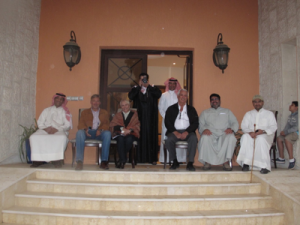 I travel because I like to spend part of my time out of my comfort zone. Our trip to Qatar, Kuwait, and Dubai certainly qualifies on that count. That’s not to say that I was ever uneasy on our trip (unless you count the time that I spent with my hand tangled in the bowels of an airplane seat). We had all the creature comforts one could ask for. Great, but long, flights. First class hotels. Great food. Wonderful hospitality. Yet we knew that this was something out or our prior experience or even out of our world. It wasn’t just the women wearing their abayas and veils or the men and their dishdashis, nor was it the incessant calls to prayer that punctuated daily life. It wasn’t the camels roaming free in the desert or the desert itself. It wasn’t the pleasantly murmured “inshallah” that one heard in every conversation. It wasn’t the humus or tabouleh served with the ubiquitous arabic bread at every meal. It wasn’t even the acrid cardmom based coffee that one couldn’t agreeably turn down. It was, I think, as we’d say in Texas, the whole enchilada.
I travel because I like to spend part of my time out of my comfort zone. Our trip to Qatar, Kuwait, and Dubai certainly qualifies on that count. That’s not to say that I was ever uneasy on our trip (unless you count the time that I spent with my hand tangled in the bowels of an airplane seat). We had all the creature comforts one could ask for. Great, but long, flights. First class hotels. Great food. Wonderful hospitality. Yet we knew that this was something out or our prior experience or even out of our world. It wasn’t just the women wearing their abayas and veils or the men and their dishdashis, nor was it the incessant calls to prayer that punctuated daily life. It wasn’t the camels roaming free in the desert or the desert itself. It wasn’t the pleasantly murmured “inshallah” that one heard in every conversation. It wasn’t the humus or tabouleh served with the ubiquitous arabic bread at every meal. It wasn’t even the acrid cardmom based coffee that one couldn’t agreeably turn down. It was, I think, as we’d say in Texas, the whole enchilada.
I am now eight thousand miles and several days removed from the scene of these experiences, and I’ve had time to process my thoughts, feelings, and impressions. If you don’t mind, I’ll share a few of them here with you.
1. Oil is king. Unlike our British cousins who, when the regent passes, only mutter, “le roi est mort, vive le roi” and continue on their way, when king oil dies, there will be nothing to replace him. Yes, I know they’re intending to build economies of the future built on education, health care and soccer, but I think it more likely that if all oil and gas production were stopped tomorrow there wouldn’t be another skyscraper or luxury hotel built for a long, long time.
2. There’s the woman thing. I heard all manner of explanations about the role of women in the middle east, and I’ve even done some reading since I’ve returned home, and none of it makes any sense to me. According to my handy CIA fact book, women comprise more than 50% of the population of the region, and in parts of the region not only are they not allowed to be seen wearing culottes, they can’t drive a car or work. Then add in the fact that they have to traipse around in 120 degree heat wearing a long black frock that covers them from head to toe. They make a big deal out of the fact that recently a couple of progressive countries/emirates/sheikhdoms have allowed women to vote. Whoopee! They can’t be contributors to a productive economy, except in wifely ways, but they can cast a vote in elections that don’t really matter because the rulers are hereditary. Go figure.
3. These economies are not only overheated, they are over wrought. Ok, it may make sense to build an indoor ski slope in an area where no one knows how to ski, but I doubt it. I know for sure that empty hotel rooms and office space cannot be tolerated forever, and certainly it should be a signal that it may not be a great time to keep bringing in Bangladeshis to sling more cement.
4. The desert really is in their blood. The business about training a predator bird and taking him to the desert to kill rabbits or whatever other creatures exist out there is for real. At least, here in the US of A, we are smart, and comfortable about it. We take our high powered rifles to our designer cabins in the woods and blast away at whatever we see, and we get to drink whiskey after the sun goes down. They, on the other hand, sit around camp fires sucking marrow out of sheep bones and washing it down with….tea. Not my idea of a good time.
5. Remember the TV show recently which raised the spector of life without Mexicans to do the work in Los Angeles. That’s small potatoes to what would happen in societies like these where the acquisition of citizenship is virtually impossible for those who do the work. As many as 80% of the residents of the gulf region countries are expatriates. That is to say that they are imported from the nether regions of the world to perform those daily tasks of life which make life possible. Then, at the end of their two year contracts, unless renewed, they go back to where ever they came from. I’m pretty sure it’s not a sustainable model to have two tiers of society…one which has all the money and all the rights, and the other which has no rights, none of the money and does all of the work.
6. Societies rooted in tribal cultures are not conducive to democratic governance as we know it. I asked, wherever we went, about the system of government. The most charitable characterization was of a constitutional monarchy, but upon closer inspection, it was not one we would recognize. My own description would be of an enlightened dictatorship with the trappings of some faintly democratic institutions. I’m not saying that’s bad, that’s just what it is. Almost all the power resides in the familial hands of a head of state selected by…..well, I don’t know the details of how sheikhs were selected in the old days. I suspect it had something to do with being the baddest boy on the block. It’s possible today to bump one off (literally and figuratively), but it pretty much has to be done by members of extended family or tribe. It happened as recently as 1995 when the head guy in Qatar was dethroned by his son with the help of an uncle, two cousins and a partridge in a pear tree. I guess it’s better than mounting a recall vote
7. I don’t know, but I wonder, if wearing flowing white robes and making your women folk walk three paces behind and to the left is a good basis for global integration. Of course, I remember marketing 101 which emphasized that differentiation is good. But there are limits. I know the ancestors of my friend Guiseppi wore a toga in the environs of the Roman forum, but they, like the rest of us, would be wearing designer jeans and button downs today. They didn’t ask my opinion, but here it is anyway. Lose the robes and let go of the women a bit. You might enjoy the 21st century even more.
8. Religion, government and social institutions are highly integrated. This would have given Thomas Jefferson a problem, but it doesn’t seem to bother them a whit. Some allow other religious organizations so long as they don’t insult Islam (whatever that means). They call this freedom of religion. They will call a halt to any social activity to honor their call to prayer. I call this commitment.
The question I came away with is whether it can last. The risks are obvious. Oil may run out, social/political structures may disintegrate as minority populations become too large and unwieldy, or more likely, the young people who have been born into wealth and comfort will forget how to work.
I’m glad I went. I was charmed by it all.


